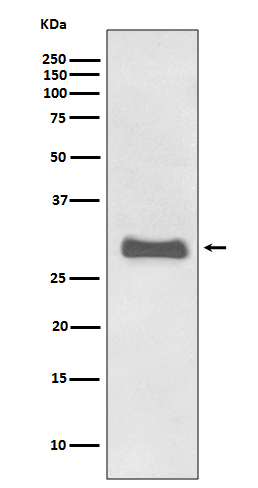
| WB | 1/500-1/1000 | Human,Mouse,Rat |
| IF | 咨询技术 | Human,Mouse,Rat |
| IHC | 1/50-1/100 | Human,Mouse,Rat |
| ICC | 1/50-1/200 | Human,Mouse,Rat |
| FCM | 1/50-1/100 | Human,Mouse,Rat |
| Elisa | 咨询技术 | Human,Mouse,Rat |
| Aliases | CJD; GSS; PrP; PRNP; ASCR; KURU; PRIP; PrPc; CD230; AltPrP; Prion protein; PrP27-30; PrP33-35C |
| Entrez GeneID | 5621 |
| WB Predicted band size | Calculated MW: 28 kDa; Observed MW: 28 kDa |
| Host/Isotype | Rabbit IgG |
| Antibody Type | Primary antibody |
| Storage | Store at 4°C short term. Aliquot and store at -20°C long term. Avoid freeze/thaw cycles. |
| Species Reactivity | Human,Mouse,Rat |
| Immunogen | A synthesized peptide derived from human Prion Protein |
| Formulation | Purified antibody in PBS with 0.05% sodium azide. |
+ +
以下是3-4篇关于Prion Protein抗体的代表性文献摘要:
---
1. **标题**:*Antibodies to the scrapie protein decorate prion rods*
**作者**:Stahl, N. et al. (1990)
**摘要**:该研究首次报道了针对朊病毒蛋白(PrP)的抗体能够特异性识别并标记朊病毒纤维(prion rods),为朊病毒疾病的体外检测提供了重要工具,并证实了PrP在疾病相关聚集物中的核心作用。
---
2. **标题**:*Monoclonal antibodies inhibit prion replication and delay the development of prion disease*
**作者**:White, A.R. et al. (2003)
**摘要**:研究筛选出多种单克隆抗体,证明其通过结合PrP的特定表位(如N端结构域)可抑制PrP^Sc(致病型)的体外聚集,并在小鼠模型中延缓朊病毒疾病的发病进程,提示抗体治疗的潜在价值。
---
3. **标题**:*Generation of monoclonal antibodies against prion proteins*
**作者**:Krasemann, S. et al. (1996)
**摘要**:通过免疫PrP敲除小鼠,成功制备了高特异性的抗PrP单克隆抗体,这些抗体能够区分PrP^C(正常型)与PrP^Sc,为朊病毒疾病的免疫诊断和机制研究奠定了基础。
---
4. **标题**:*Cross-linking cellular prion protein triggers neuronal apoptosis in vivo*
**作者**:Solforosi, L. et al. (2004)
**摘要**:研究发现某些抗PrP抗体通过交联细胞表面PrP^C,可激活下游信号通路并诱导神经元凋亡,揭示了PrP抗体在神经退行中的潜在副作用,强调了抗体设计需兼顾靶向性与安全性。
---
以上文献涵盖了抗体在朊病毒检测、治疗开发及机制研究中的关键进展。
Prion protein (PrP) antibodies are critical tools in studying prion diseases, a group of neurodegenerative disorders caused by misfolded prion proteins (PrP^Sc). The normal cellular prion protein (PrP^C) is a glycoprotein expressed predominantly in the nervous system, with unclear physiological roles, though it may contribute to synaptic function and metal ion homeostasis. In prion diseases, PrP^Sc propagates by converting PrP^C into its pathological, aggregation-prone form, leading to neuronal damage. Antibodies targeting PrP are essential for detecting and distinguishing between PrP^C and PrP^Sc, aiding in disease diagnosis, research, and therapeutic development.
Monoclonal and polyclonal PrP antibodies are generated against specific epitopes, often targeting regions like the N-terminal unstructured domain or the globular C-terminal domain. These antibodies enable techniques such as Western blotting, immunohistochemistry, and ELISA to identify prion aggregates in tissues or biological fluids. Some antibodies exhibit conformational specificity, recognizing PrP^Sc-specific structural features. Challenges include PrP^C's high conservation across species, which complicates antibody generation, and the risk of cross-reactivity.
Therapeutically, PrP antibodies are explored for their potential to block PrP^Sc propagation or promote clearance. However, translating these into treatments faces hurdles like poor blood-brain barrier penetration and immune tolerance. Despite challenges, PrP antibodies remain pivotal in advancing our understanding of prion biology and developing diagnostics and interventions for diseases like Creutzfeldt-Jakob disease and chronic wasting disease.
×